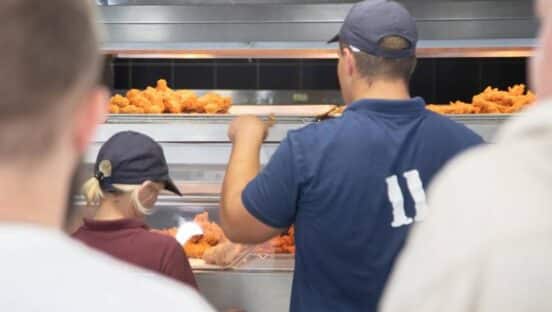Quick-service and labor groups in California struck a deal on worker regulations over the weekend, preventing a ballot fight that could have topped $100 million in campaign spending.
Representatives of the restaurant industry secured an agreement to kill the controversial AB 257 (also known as the Fast Food Accountability and Standards Recovery Act or the Fast Act) in exchange for accepting one of the bill’s key provisions, the creation of a panel to regulate wages and working conditions for fast-food restaurants. The deal also will increase the minimum wage for fast-food workers in the state to $20 an hour and eliminate a proposal to hold franchisors responsible for labor violations committed by their franchisees.
“This agreement protects local restaurant owners from significant threats that would have made it difficult to continue to operate in California,” said Sean Kennedy, EVP of public affairs for the National Restaurant Association, in a statement. “It provides a more predictable and stable future for restaurants, workers, and consumers.”
The Fast Act was signed by California Gov. Gavin Newsom last year and created a state-backed Fast Food Council with the authority to establish industry-wide standards and regulations for working conditions. Central to the Act was the panel’s ability to regulate wages. They could raise the minimum wage to $22 per hour in 2023 and 3.5 percent annually each year after.
The bill faced fierce opposition from industry leaders at the outset, with McDonald’s USA president Joe Erlinger writing a letter calling it “lopsided, hypocritical, and ill-considered.”
“Economists say it could drive up the cost of eating at a quick-service restaurant in California by 20 percent at a time when Americans already face soaring costs in supermarkets and at gas pumps,” he wrote at the time.
National Restaurant Association president and CEO Michelle Korsmo was equally critical. “It’s rare that a state legislature passes a bill that would hurt small businesses, their employees, and their customers, but California’s Fast Act does just that,” she said in a statement last August.
What followed was a busy year of political maneuvering. A coalition of restaurant groups and business owners successfully sued to block enforcement pending a statewide referendum in 2024. Unions, labor groups, and legislators who drafted the measure responded by pushing AB 1228 (also known as the Fast Food Franchisor Responsibility Act). That bill was introduced earlier this year and sought to hold large quick-service franchisors jointly liable for accusations of harassment and wage theft at the individual restaurant level–a provision that was stripped from the Fast Act during last-minute negotiations. Proponents of AB 257 and 1228 also quietly secured funding for the revival of the Industrial Welfare Commission, a separate council approved over the summer that could raise wages without limit.
Assemblymember Chris Holden introduced AB 1228 in June. He told Politico yesterday that the impending ballot fight and the followup bill created the conditions for a compromise. The deal was announced on Monday by the Service Employees International Union. It seeks to eliminate the joint-employer provision of AB 1228 and amend the bill with various changes, including the $20 minimum wage set to take effect in April.
The weekend deal offers concessions on both sides. The Council will be able to increase the minimum wage for fast-food workers by either 3.5 percent or an amount based on average changes to consumer price index (whichever is lower.) Lawmakers also agreed to defund the Industrial Welfare Commision, which was set to meet in January.
The deal prohibits the Council from considering predictable scheduling, paid leave, or vacation. And while the Fast Act permitted municipalities with a population of at least 200,000 to create their own councils, the agreement restricts other areas within the state from establishing local panels or implementing additional wage increases.
The pact includes changes to the Council’s composition, too. The Fast Act created a 10-member panel appointed by state leaders, with seats filled by two fast-food franchisors, two franchisees, two advocates of workers’ rights, one representative from the Department of Industrial Relations, and one representative from the Governor’s Office of Business and Economic Development. The new agreement calls for a nine-member council consisting of two quick-service industry representatives, two franchisees or restaurant owners, two employees, two advocates for restaurant employees, and an unaffiliated member of the public who will serve as the chair. The Department of Industrial Relations and the Governor’s Office of Business and Economic Development will provide non-voting members. Additionally, the Council will be required to conduct open feedback sessions and establish a platform where fast-food employers and employees can share input on matters under consideration.
The agreement also tackles a significant concern raised by large chains regarding the Fast Act, which only pertains to restaurants with at least 100 units nationwide. It would lower that threshold to 60 units, meaning regional competitors to major chains will have to adhere to the same wage and workplace requirements laid out by the Council.
The revised version of AB 1228 hasn’t been approved by the California legislature, but the agreement calls for passage in both the assembly and the Senate by Thursday. All of the changes are contingent on the industry withdrawing its referendum challenging the Fast Act by January 1.
Newsom late last week helped clear the way for the deal by signing a bill that allows campaigns to pull referendums after they’ve qualified for the ballot. The legislation also changed the “yes” or “no” voting options on referendums to “keep the law” or “overturn the law.”


